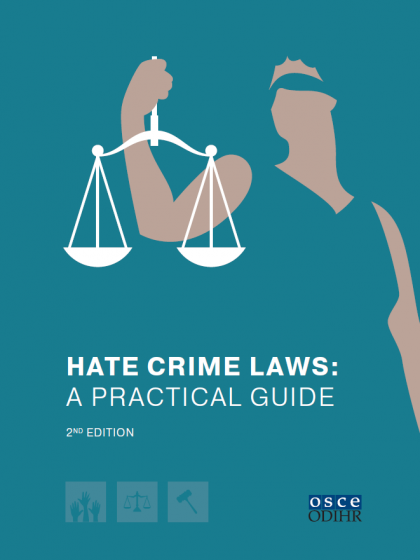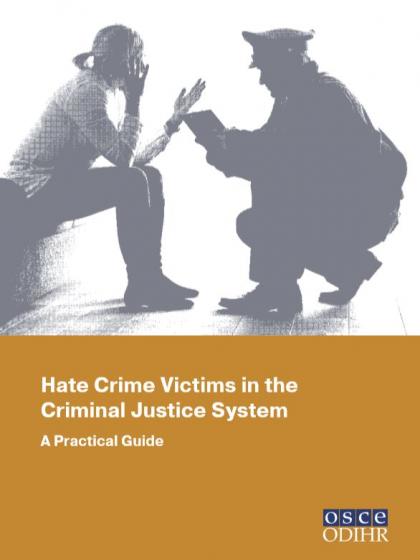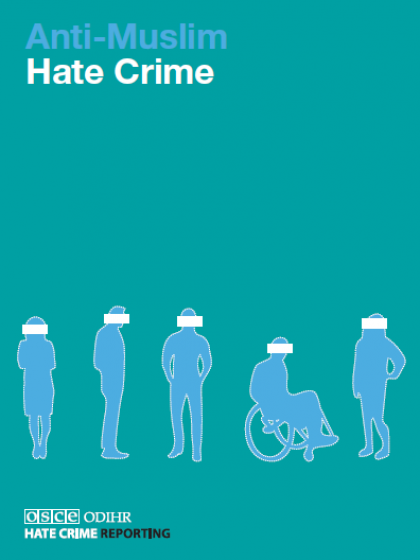Publications
Understanding Anti-Christian Hate Crimes and Addressing the Security Needs of Christian Communities — A Practical Guide
Publishing date: 28 July 2025
Content type: Guide / manual / handbook
Where we are: OSCE Office for Democratic Institutions and Human Rights
What we do: Tolerance and non-discrimination
Publisher: Organization for Security and Co-operation in Europe
Anti-Christian hate crimes — criminal offences motivated by bias against Christians — are an extreme manifestation of intolerance that send a harmful message of exclusion to victims and their communities.
Hate Crime Laws: A Practical Guide. Revised Edition
Publishing date: 23 September 2022
Collections: Guides Related to Hate Crime
Content type: Guide / manual / handbook
Where we are: OSCE Office for Democratic Institutions and Human Rights
What we do: Tolerance and non-discrimination
Publisher: Organization for Security and Co-operation in Europe
The purpose of this Guide is to provide OSCE participating States with benchmarks for drafting hate crime legislation within a simple, clear and accessible document. While good practices are highlighted and risks identified, a prescriptive approach has been avoided. Hate crimes are specific to their social context, and legislation must recognize this. The Guide assists states wishing either to enact new legislation or to review and improve their current legislation by setting out the major questions to be addressed by legislators; giving examples of drafting choices made by different states; commenting on the implications of different approaches; making recommendations concerning specific aspects of hate crime law, and offering a list of further resources to supplement the information provided.
Hate Crime Victim Support: Policy Brief
Publishing date: 22 April 2022
Content type: Guide / manual / handbook
Where we are: OSCE Office for Democratic Institutions and Human Rights
What we do: Tolerance and non-discrimination
Publisher: Organization for Security and Co-operation in Europe
Hate Crime Victim Support: Policy Brief Hate Crime Victim Support: Policy Brief This policy brief condenses the knowledge and key findings of the Enhancing Stakeholder Awareness and Resources for Hate Crime Victim Support (EStAR) project implemented by the OSCE Office for Democratic Institutions
Manual- How to responsibly report on hate speech?
Publishing date: 11 October 2023
Content type: Guide / manual / handbook
Where we are: OSCE Mission to Montenegro
What we do: Media freedom and development
Publisher: Organization for Security and Co-operation in Europe
This publication has been developed by the Technical Working Group on Self-Regulation and supported by the OSCE Mission to Montenegro. In order to help solve the challenge of responsible reporting on hate speech, the Manual offers answers to the questions 1) how to detect hate speech in public space and 2) in what way- which method- to report on hate speech, while respecting the high standards of investigative and professional journalism in the public interest. The publication is available only in Montenegrin.
Structural Arrangements for Hate Crime Victim Support: Policy Brief
Publishing date: 28 January 2022
Content type: Guide / manual / handbook
Where we are: OSCE Office for Democratic Institutions and Human Rights
What we do: Tolerance and non-discrimination
Publisher: Organization for Security and Co-operation in Europe
This policy brief provides an overview of the concrete steps and measures governments can take to establish or strengthen structural arrangements to make a comprehensive and needs-based hate crime victim support system a reality.
Including the voices of hate crime victims in policymaking and policy implementation — a practical guide
Publishing date: 3 June 2024
Content type: Guide / manual / handbook
Where we are: OSCE Office for Democratic Institutions and Human Rights
What we do: Tolerance and non-discrimination
Publisher: Organization for Security and Co-operation in Europe
This guide, which is built around ten key guiding principles, is aimed at national stakeholders who are interested in the meaningful and considerate inclusion of hate crime victims’ voices in policymaking and policy implementation processes.
Hate Crime Victims in the Criminal Justice System
Publishing date: 9 April 2020
Collections: Guides Related to Hate Crime
Content type: Guide / manual / handbook
Where we are: OSCE Office for Democratic Institutions and Human Rights
What we do: Tolerance and non-discrimination
Publisher: Organization for Security and Co-operation in Europe
This Guide advances the fulfilment of the OSCE commitments to assist hate crime victims. Developed in consultation with civil society and government experts, and based on good practice identified across the region, the Guide responds to a need in many OSCE participating States, where victims of hate crime often do not receive adequate protection and support. It addresses gaps in integrating assistance efforts with criminal justice processes and is designed primarily for hate crime victim support practitioners, criminal justice officials and policymakers responsible for developing and maintaining victim support systems. It provides practical recommendations on adapting procedures, policies and laws, while taking into account the realities and complexities of criminal justice and victim support systems.
Compendium: Practices of Civil Society and Government Collaboration for Effective Hate Crime Victim Support
Publishing date: 18 March 2022
Content type: Guide / manual / handbook
Where we are: OSCE Office for Democratic Institutions and Human Rights
What we do: Tolerance and non-discrimination
Publisher: Organization for Security and Co-operation in Europe
This Compendium has been created by the the OSCE Office for Democratic Institutions and Human Rights (ODIHR), in partnership with the Association of Counselling Centers for Victims of Right-Wing, Racist and Antisemitic Violence in Germany (VBRG).
Anti-Muslim Hate Crime
Publishing date: 22 February 2018
Collections: Hate Crime Factsheets
Content type: Factsheet
Where we are: OSCE Office for Democratic Institutions and Human Rights
What we do: Tolerance and non-discrimination
Publisher: Organization for Security and Co-operation in Europe
Muslim communities across the OSCE region are the victims of rhetoric that often associates them with terrorism and extremism, or portrays the presence of Muslim communities as a threat to national identity. Muslims are often portrayed as a monolithic group, whose religion and culture are incompatible with the concepts of human rights and democracy. This intolerance, left unchecked, can enable a climate that fosters hate crime against Muslims, which is an attempt to isolate them from society. Only a strong response from all actors in society can effectively challenge discrimination, intolerance and hate crimes against Muslims.
Prosecuting Hate Crimes: A Practical Guide
Publishing date: 29 September 2014
Collections: Guides Related to Hate Crime
Content type: Guide / manual / handbook
Where we are: OSCE Office for Democratic Institutions and Human Rights
What we do: Tolerance and non-discrimination
Publisher: Organization for Security and Co-operation in Europe
Prosecuting Hate Crimes: A Practical Guide was written in cooperation with the International Association of Prosecutors to improve the investigation and prosecution of hate crimes across the OSCE region. The guide is relevant to different legal systems and legislative frameworks and complements ODIHR’s Prosecutors and Hate Crime Training (PAHCT). This guide aims to explain the impact of hate crimes by highlighting their specific features compared with other crimes. It presents the most common issues that arise for prosecutors in dealing with these crimes, with an emphasis on evidence of bias motivation, which is the distinguishing factor in hate crimes.










